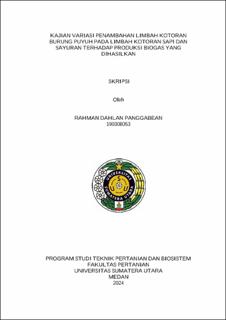| dc.description.abstract | Energy serves as a vital necessity for every individual globally, with the majority of personal actions revolving around its utilization. Nonetheless, the reserves of current energy sources are diminishing with time and may harm the climate, adversely affecting the ecosystem. Consequently, there is a necessity for renewable alternative energy sources, such as biogas. Biogas is a renewable energy source capable of substituting LPG, gasoline, and power plants, generated through the fermentation of organic waste. Organic waste suitable for biogas production includes quail waste, cow manure, and vegetables. This study aimed to ascertain the ideal proportion of quail waste concerning biogas production. This research employed an experimental methodology utilizing a non-factorial fully randomized design (CRD) with four treatments and three replications. This study's results indicate that the maximum initial temperature recorded was 29.4°C in treatment 1, which did not include quail waste, while the minimum starting temperature was 28.9°C in treatment 3, which contained 15% quail waste. The maximum and minimum starting and final pH values were 7.223 and 7.220, the maximum and minimum biogas quantities were 51.4 L and 21.3 L, the maximum and minimum flame duration tests were recorded in treatment 1 at 20.7 minutes and in treatment 4 at 7.4 minutes.The research findings indicate that the inclusion of quail waste significantly impacts biogas volume, production rate, flame duration, and biogas pressure. | en_US |


